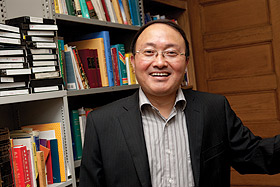News Archives - 2010
Professor Hao takes home lessons in Western education
 Professor Tugen Hao heads back to China next week after spending four months at Augsburg as a visiting professor and researcher. During these four months he observed three classes, pursued his own research, and taught Chinese. He found time to travel coast-to-coast, visiting Los Angeles, Las Vegas, the Grand Canyon, Boston, New York, and Washington, D.C.—and he discovered where to find Chinese food in the Twin Cities.
Professor Tugen Hao heads back to China next week after spending four months at Augsburg as a visiting professor and researcher. During these four months he observed three classes, pursued his own research, and taught Chinese. He found time to travel coast-to-coast, visiting Los Angeles, Las Vegas, the Grand Canyon, Boston, New York, and Washington, D.C.—and he discovered where to find Chinese food in the Twin Cities.
Hao is dean of the foreign language department and a professor of 19th-century American literature at Anqing Teachers College, a four-year college of about 20,000 students in Anhui Province. While at Augsburg, he observed three literature classes, two taught by Professor Colin Irvine—an American Literature class for Weekend College students and Environmental Literature—and English Novels, taught by Professor Dallas Liddle, who also helped him with research at the University of Minnesota's Wilson Library. Hao has also continued his own research on British novelist Thomas Hardy.
Several Augsburg faculty, staff, and students took advantage of Hao's offer to teach an eight-week informal class in Chinese. Because of the difficulty in reading Chinese characters, Hao focused on phonetics and pronunciation to learn basic everyday conversation, repetition after repetition.
Hao helped the group understand differences between the two languages—the fact that English has many more words than Chinese, rendering it better for precise definitions of law or descriptive passages in literature, while the sparser Chinese can express layers of nuanced meaning in poetry.
Rebecca John, assistant vice president for marketing and communication, joined the conversation group to get a feel for a language so different from anything she had studied.
"It was phenomenal to have a native speaker as a model, listening to his tones," John says, "and because he has studied English, he knew where we, as English speakers, were coming from."
John knew nothing about language tones, and at first everything sounded totally foreign. Now, when she hears a new word, she knows she can learn it and retain it. "I have a place in my brain now for Chinese."
What Hao found interesting in the classes he observed and carries back home with him is greater understanding of the similarities and differences between American and Chinese students.
"The biggest difference," he says, "is the importance attached to liberal arts." American students have a wide range of knowledge, and American classes are "student-centered." That is to say, most of the class time is taken up by students, and if they want to participate, they need to prepare. American students learn both from their teachers and their peers.
China's "knowledge-based" system is the reverse. Teachers occupy most of the class time, and students generally don't speak up or ask questions.
Hao attributes this difference to American individualism and Chinese collectivism. Chinese teachers are considered authority figures, and despite most attempts to encourage students to speak out, they remain reticent. As China becomes more globalized and interacts with the West, however, Hao believes students are gradually becoming more creative and critical thinkers.
Next week, Hao returns to finish out the last two months of the Chinese term at his college, which began in March and runs through July.
Inside Augsburg showcases the experiences of Augsburg College students, alumni, staff, and faculty. Send your story idea to marcomm@augsburg.edu.